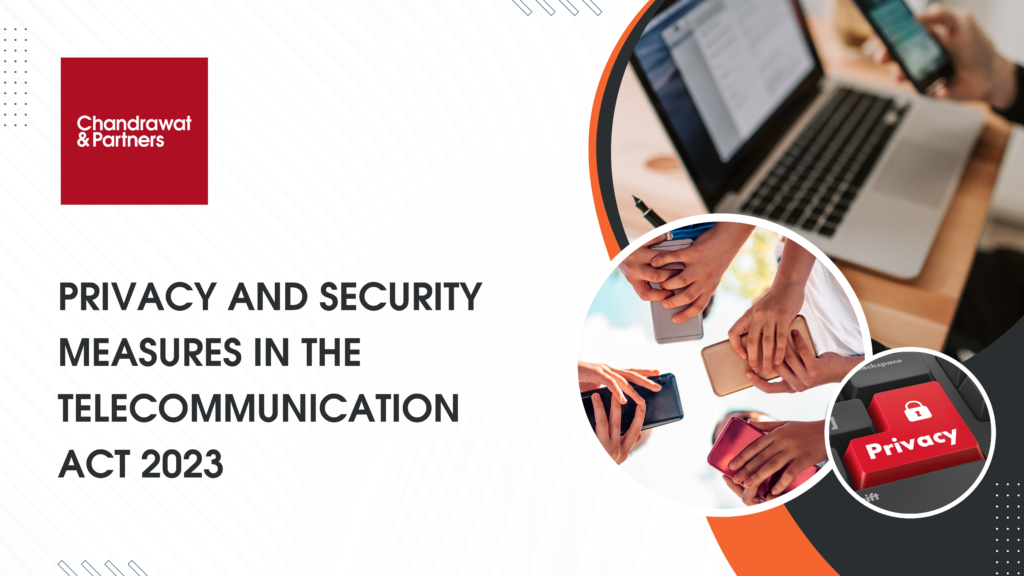Share :
Introduction
As of July 2022, India, the world’s second-largest telecommunications market with an 85.11% teledensity, actively engages in the 5G race, advancing the Digital India initiative. The Telecommunication Act 2023, enacted in December 2023, is a pivotal step, prioritizing a robust security framework to protect mobile networks from cyber threats. Demonstrating India’s commitment, the legislation emphasizes advancing telecommunications infrastructure while ensuring the resilience of critical communication systems.
AUTHORIZATION AND LICENSING REQUIREMENTS
For entities to provide telecommunication services or operate telecommunications networks, obtaining prior approval from the central government is mandatory. This regulatory measure ensures a controlled and monitored entry into the telecom domain, fostering a more secure and regulated environment. Importantly, existing licenses retain their validity for the duration originally granted up to five years, offering stability to operators while aligning with the evolving industry landscape.
SPECTRUM ALLOCATION AND USAGE
Spectrum, a finite and valuable resource, is designated through auctions, with exceptions for specific purposes such as national security, disaster management, and satellite services. The legislation empowers the government with the authority to repurpose frequency ranges, facilitating spectrum sharing, trading, leasing, and surrender. This flexibility in spectrum management is essential for optimizing its utilization, meeting evolving technological demands, and promoting a competitive market environment.
SATELLITE INTERNET PROVISION
Acknowledging the growing significance of satellite-based internet services, the Act introduces provisions for allocating spectrum to satellite internet providers like OneWeb and SpaceX’s Starlink. Notably, active authorizations have already been granted to OneWeb and Jio, signaling a strategic alignment with advancements in satellite technology. This forward-looking approach not only supports the expansion of internet connectivity but also positions India at the forefront of emerging satellite communication technologies.
SURVEILLANCE AND SUSPENSION POWERS
Authorities can intercept, monitor, or block messages on specified grounds related to public safety or emergencies. Moreover, the legislation empowers the government to suspend telecom services temporarily, and in exigencies, take temporary possession of critical infrastructure. These provisions underscore the Act’s commitment to safeguarding the nation’s interests, especially during times of crisis or potential threats to public safety.
REGULATION AND STANDARDS
The central government is empowered to prescribe and enforce these standards, ensuring the quality, reliability, and security of the telecom ecosystem. Notably, amendments to the Telecom Regulatory Authority of India (TRAI) Act, 1997 set stringent criteria for the appointment of TRAI chairpersons and members, signaling a commitment to leadership with substantial experience in telecommunications, industry, finance, law, accountancy, management, or consumer affairs. The inclusion of potential appointments from the private sector further reflects a recognition of the dynamic nature of the telecommunications industry.
DIGITAL BHARAT NIDHI AND OTT SERVICES
The Act retains the Universal Service Obligation Fund (USOF), now referred to as Digital Bharat Nidhi, underscoring its continued importance for research and development initiatives in the digital domain. Notably, the legislation excludes over-the-top (OTT) services from its purview, signaling a potential shift in their regulation under the Digital India Act, 2023. This nuanced approach recognizes the unique nature of OTT services and suggests a dedicated regulatory framework to address their specific challenges and opportunities.
LEGAL OFFENCES AND PENALTIES
Criminal and civil offenses, including unauthorized provision of telecom services and breaches of terms, are explicitly outlined. Penalties, ranging from fines to imprisonment, provide a robust deterrent against unlawful activities. Adjudication of these offenses is entrusted to designated officers and committees, ensuring a fair and transparent legal process.
NATIONAL SECURITY MEASURES
Integrated into the law are provisions initially established after the 2020 India-China border conflict. These measures emphasize preventing the importation of telecom equipment from potentially adversarial nations, fortifying India’s national security. In its entirety, the Telecommunications Act of 2023 stands as a comprehensive framework, ushering in regulatory precision and security in India’s dynamic telecommunications sector.
CONCLUSION
The Telecommunications Act of 2023 stands as a transformative force, reshaping India’s telecommunications landscape. Its stringent authorization processes, spectrum management strategies, and emphasis on national security underscore a commitment to a secure, efficient, and competitive industry. The Act’s forward-looking approach, accommodating satellite internet advancements and private sector expertise in regulatory bodies, positions India at the forefront of global telecommunications innovation. With a keen eye on standards, legal frameworks, and emerging technologies, the legislation not only addresses present challenges but also sets the stage for a resilient, dynamic, and technologically advanced future in the realm of telecommunications.
HOW WE CAN HELP?
We ensure compliance with the Telecommunications Act of 2023. We provide legal expertise to businesses seeking authorization, licensing, and spectrum allocation, ensuring adherence to regulatory requirements. Additionally, our experts aid in formulating strategies for spectrum management, navigating surveillance and suspension powers, and addressing legal offenses and penalties. With a focus on regulatory compliance, our team of experts guides clients through the intricacies of the Act, offering risk mitigation strategies and assistance in adapting to evolving telecommunications laws and standards.
For more information or queries, please email us at
[email protected]





